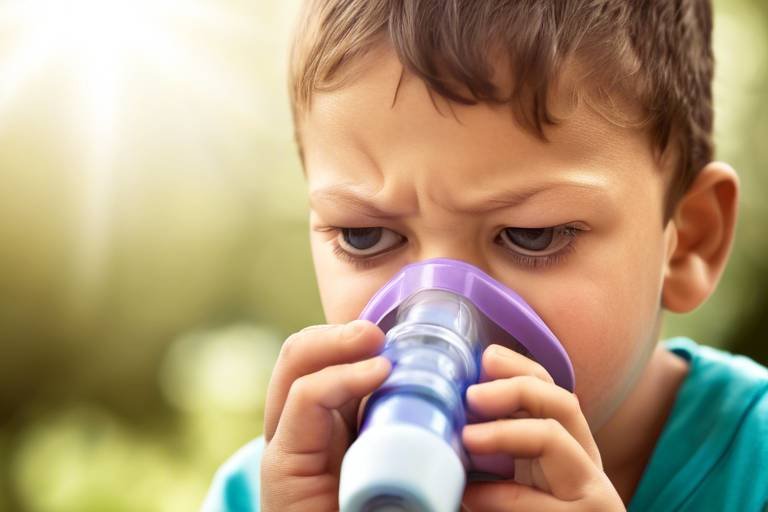Preparing Your Child for Their First Doctor's Visit
Every parent remembers the first time they took their child to the doctor. It can be a mix of excitement and anxiety, not just for the little one but for the parents too. Preparing your child for their first doctor’s visit is crucial in ensuring that the experience is as smooth and positive as possible. After all, the goal is to instill a sense of comfort and trust in the healthcare system from an early age. Think of it as laying the foundation for a lifelong relationship with health and wellness.
So, how do you make this first visit less daunting? It starts with understanding the importance of these early visits. They are not just about checking off a box on a to-do list; they are essential in building a solid health foundation for your child. Regular check-ups and vaccinations are vital for preventing illnesses and promoting overall well-being. Just like how we nurture a plant with sunlight and water, our children's health needs consistent care and attention.
Choosing the right pediatrician is one of the most important steps in this process. You want someone who aligns with your family's values and understands your child's unique needs. Consider factors like experience, communication style, and the comfort level of both you and your child. A pediatrician who can explain things in a way that resonates with your child can make all the difference. This is where researching pediatricians comes into play. Read reviews, ask for recommendations from friends or family, and check credentials. You want to find someone who not only has the qualifications but also makes you and your child feel at ease.
Once you have a short list, scheduling a meet-and-greet with potential pediatricians can be a game-changer. This informal visit allows you to assess compatibility and ask any burning questions you might have. It’s a chance to see how the pediatrician interacts with your child and whether they can build rapport. Think of it as a first date; you want to feel that connection before committing to a long-term relationship.
While preparing for the visit, it’s also beneficial to compile a list of questions for the doctor. This proactive approach not only helps you address specific concerns but also ensures that you leave the appointment feeling informed and empowered. Questions could range from developmental milestones to dietary recommendations. Having these discussions can provide clarity and peace of mind.
Now, let’s talk about the actual visit. Familiarizing your child with common procedures, like vaccinations and check-ups, can significantly reduce their anxiety. Explain what to expect in simple terms. For instance, you might say, "The doctor will check your heart with a stethoscope, just like how we listen to music with headphones." This way, you’re turning something that sounds scary into something relatable.
Another effective technique is role-playing the visit. This can help your child feel more comfortable with the idea of going to the doctor. You can simulate the experience at home, allowing them to express their feelings and ask questions in a safe environment. Incorporating toys and games can make this role-playing even more engaging. Perhaps use a stuffed animal as the "patient" and take turns being the doctor. This playful approach encourages children to interact and understand the medical environment without fear.
Throughout this process, it’s essential to encourage open communication about feelings and fears. Validate their emotions and reassure them that it’s okay to feel nervous. Sometimes, just knowing that they can talk about their worries makes a world of difference. It’s like having a safety net; they know they can rely on you to help them navigate their feelings.
Finally, after the visit, take some time for post-visit reflection. Discuss what went well and address any lingering fears your child may have. This reinforces positive experiences and helps them feel more confident about future appointments. Just like any adventure, talking about it afterward can turn a daunting experience into a cherished memory.
- What should I bring to the doctor's visit? Bring your child's medical history, any medications they are currently taking, and a list of questions you want to ask.
- How can I calm my child before the visit? Talk to them about what to expect, play games that mimic the doctor's visit, and reassure them that you will be there the entire time.
- What if my child is scared of needles? Explain the process calmly, and consider bringing a comfort item, like a favorite toy, to help ease their anxiety.

Understanding the Importance of Early Visits
When it comes to your child's health, starting early can make all the difference. Early doctor visits are not just about getting a check-up; they are the building blocks for a healthy future. Imagine laying the foundation of a house—if it's solid, the house stands strong. Similarly, regular visits to the pediatrician help establish a solid health foundation for your little one.
These early visits are crucial for several reasons. First and foremost, they allow for **early detection** of any potential health issues. Just like how a small crack in a wall can lead to bigger problems down the line, catching health concerns early can prevent them from escalating. For instance, routine screenings can identify developmental delays or nutritional deficiencies that might otherwise go unnoticed.
Moreover, these visits are essential for **immunizations**. Vaccinations protect your child from serious diseases that can have long-term effects. The Centers for Disease Control and Prevention (CDC) recommends a schedule for vaccinations starting from infancy. By adhering to this schedule, parents can ensure their children are protected against illnesses like measles, mumps, and whooping cough. Here’s a quick overview of some common vaccinations:
| Vaccine | Age | Diseases Prevented |
|---|---|---|
| Hepatitis B | At birth, 1-2 months, 6-18 months | Liver infection |
| DTP (Diphtheria, Tetanus, Pertussis) | 2 months, 4 months, 6 months, 15-18 months, 4-6 years | Respiratory diseases |
| MMR (Measles, Mumps, Rubella) | 12-15 months, 4-6 years | Viral infections |
Additionally, early visits help parents build a relationship with their child's healthcare provider. This relationship is vital for creating a comfortable environment where parents can freely discuss concerns and questions. Think of it as planting a seed; the more you nurture it, the stronger it grows. A good rapport with the pediatrician can lead to better communication and more personalized care.
Lastly, these visits are an excellent opportunity for parents to gain knowledge about their child's growth and development. Pediatricians can provide valuable insights on nutrition, sleep patterns, and behavioral milestones. It’s like having a roadmap that guides you through the often confusing journey of parenthood. By understanding what to expect at different stages, parents can feel more empowered and less anxious.
In conclusion, early doctor visits are not just a formality; they are a proactive step in ensuring your child's well-being. By prioritizing these appointments, you are giving your child the best chance for a healthy, happy life. So, when the time comes for that first visit, remember—it's about laying a strong foundation for a bright future.

Choosing the Right Pediatrician
When it comes to your child's health, choosing the right pediatrician is like picking the perfect pair of shoes. You want something that fits just right, feels comfortable, and supports your child’s growth. A pediatrician isn’t just a doctor; they become a trusted partner in your child's health journey. So, how do you find that perfect match? It all starts with understanding what you need and what to look for.
First and foremost, consider the experience of the pediatrician. A doctor with years of experience in child healthcare is likely to have encountered a wide variety of situations. They can provide insights and advice that newer doctors may not yet possess. However, experience isn't everything. You also want a pediatrician with a communication style that resonates with you and your child. It’s essential that they can explain things in a way that’s easy to understand, especially when it comes to complex medical terms.
Another critical factor is the comfort level of both you and your child. Trust your instincts—if you feel uneasy during your first meeting, it might be a sign to keep looking. A pediatrician should create an environment where your child feels safe and secure. This is particularly important for young children who may already be apprehensive about doctor visits. Look for signs that the pediatrician is friendly and approachable, and make sure they engage well with your child.
In your search, you might want to consider the following factors:
- Location: Is the pediatrician's office conveniently located? This can make a big difference, especially if you have to make frequent visits.
- Office Hours: Do their office hours align with your schedule? Flexibility can be a lifesaver.
- Insurance: Does the pediatrician accept your health insurance? This can help avoid unexpected costs.
Once you’ve narrowed down your options, it’s time to dive into some research. Read reviews online, ask for recommendations from friends or family, and check the pediatrician’s credentials. You want someone who is not only qualified but also has a good reputation in the community. Remember, this is about your child's health, and you deserve to have the best care possible.
Finally, consider scheduling a meet-and-greet with potential pediatricians. This informal visit allows you to ask questions and gauge compatibility. It’s an excellent opportunity to see how the pediatrician interacts with your child and to address any concerns you might have. Think of it as a first date—you're trying to see if there's a connection. Trust me, this step can make all the difference in ensuring a positive experience for both you and your little one.

Researching Pediatricians
When it comes to finding the right pediatrician for your child, the process can feel a bit overwhelming. After all, this is the person who will be responsible for your child's health and well-being! So, how do you go about effectively? First, start by considering the importance of personal recommendations. Ask friends, family, and even your own doctor for suggestions. They can provide insights based on their experiences, which can be invaluable in narrowing down your options.
Next, take advantage of the wealth of information available online. Websites like Healthgrades and Zocdoc offer reviews and ratings for pediatricians in your area. Look for patterns in the feedback—are there consistent praises or complaints? This can give you a clearer picture of what to expect. Additionally, check their credentials and board certifications to ensure they are qualified to care for your little one.
It’s also essential to consider the pediatrician's experience. Some doctors specialize in certain areas, such as developmental disorders or allergies. If your child has specific health concerns, you might want to look for a pediatrician with expertise in that area. You can typically find this information on the pediatrician’s practice website or by calling their office directly.
Another crucial aspect to think about is the communication style of the pediatrician. You want someone who is not only knowledgeable but also approachable and willing to listen to your concerns. During your research, pay attention to how the pediatrician interacts with both parents and children in reviews. A great way to assess this is by scheduling a meet-and-greet, where you can observe their demeanor and ask questions in a relaxed setting.
Finally, consider the location and office hours. You’ll want a pediatrician whose office is conveniently located and has hours that fit your family’s schedule. After all, the last thing you want is to be scrambling to get to appointments! Make sure to check if they offer telemedicine options as well, which can be a lifesaver for minor concerns.
In summary, researching pediatricians involves a combination of personal recommendations, online reviews, checking credentials, and assessing communication styles. By taking the time to do your homework, you can find a pediatrician who not only meets your child's health needs but also makes the experience as smooth as possible for both you and your little one.

Scheduling a Meet-and-Greet
Scheduling a meet-and-greet with your chosen pediatrician is an invaluable step in ensuring a smooth transition for your child into the world of medical visits. This informal encounter not only allows you to gauge the pediatrician's personality and approach but also provides an opportunity for your little one to get acquainted with the doctor in a low-pressure setting. Imagine walking into a cozy room where the doctor greets you with a warm smile, and suddenly, the daunting idea of a doctor's appointment feels a little less intimidating.
During this meet-and-greet, you can ask questions that matter most to you and your family. Here are some key points to consider discussing:
- Experience: Inquire about the pediatrician's background and experience with children of your child's age.
- Communication Style: Observe how the pediatrician interacts with your child. Do they get down to your child's level? Are they gentle and approachable?
- Office Environment: Take note of the office atmosphere. Is it child-friendly? Are there toys or books available to keep kids entertained?
- Emergency Protocols: Ask about how the pediatrician handles emergencies and after-hours care.
By preparing these questions in advance, you can make the most of your time during the meet-and-greet. It’s also a great chance for your child to express any initial fears or concerns they might have about visiting the doctor. Encourage them to share their feelings, whether it's excitement or apprehension. This open dialogue sets a positive tone for future visits.
Lastly, don't forget to consider your own comfort level as a parent. Trust your instincts; if you feel a connection with the pediatrician and believe they will provide excellent care for your child, that's a good sign. After all, building a trusting relationship with your child's doctor is crucial for their ongoing health journey. So, take the time to schedule that meet-and-greet—it's a small investment that can lead to a lifetime of positive healthcare experiences for your child.
Here are some common questions parents have regarding scheduling a meet-and-greet with a pediatrician:
- How long should a meet-and-greet last? Typically, these meetings last about 20-30 minutes, giving you ample time to ask questions and get comfortable.
- Is there a fee for the meet-and-greet? Some pediatricians may charge a nominal fee, while others offer it for free. It's best to check in advance.
- Can I bring my child to the meet-and-greet? Absolutely! In fact, it's encouraged so they can meet the doctor and start building rapport.

Preparing Questions for the Doctor
When it comes to your child's health, being prepared is half the battle. One of the best ways to ensure that you get the most out of your child's doctor's visit is by preparing a list of questions beforehand. This proactive approach not only helps you address specific concerns but also ensures that you leave the appointment feeling informed and confident about your child's health. So, what should you ask? Let’s break it down.
First and foremost, consider your child's medical history and any current health issues. Are there specific symptoms that worry you? Perhaps your child has been experiencing frequent colds or has a persistent cough. Jot down these observations, as they can provide valuable insights for the pediatrician. Additionally, if your child has allergies or chronic conditions, make sure to include questions about managing these effectively.
Next, think about your child's development milestones. Questions like, "Is my child meeting their developmental milestones?" or "What should I expect in the next few months?" are essential. Understanding what is typical for your child's age can ease your worries and help you support their growth effectively.
Moreover, vaccinations are a hot topic for many parents. If your child is due for shots, it’s perfectly reasonable to ask, "What vaccines will my child receive today?" and "Are there any side effects I should watch for?" This not only prepares you for the visit but also helps you gauge the importance of vaccinations in your child's health journey.
Lastly, consider questions about nutrition and lifestyle. Asking about healthy eating habits, physical activity, and screen time can provide you with valuable guidance. You might ask, "How can I ensure my child is eating a balanced diet?" or "What activities are best for my child's age group?" These inquiries can help you create a nurturing environment that promotes overall well-being.
To sum it up, preparing questions for the doctor is not just about gathering information; it’s about empowering yourself as a parent. Here’s a quick recap of potential questions to consider:
- What should I do if my child has a fever?
- Are there any signs of concern I should look out for?
- How can I support my child's emotional health?
By taking the time to prepare these questions, you not only facilitate a more productive visit but also foster a collaborative relationship with your pediatrician. Remember, your child's health is a journey, and being informed is a crucial step in navigating it successfully.
1. What should I do if I forget my questions during the visit?
Don't panic! It's perfectly normal to forget things under stress. You can always ask the doctor to clarify anything you might have missed or schedule a follow-up if necessary.
2. How can I make my child feel more comfortable during the visit?
Explain what will happen in simple terms and let them know it’s okay to ask questions. Bringing a favorite toy or book can also help ease their anxiety.
3. Are there any specific questions I should ask about vaccinations?
Yes! Ask about the vaccines your child will receive, their benefits, and any potential side effects to be aware of.

Understanding Common Procedures
When it comes to a child's first doctor visit, understanding common procedures can significantly reduce anxiety for both the child and the parent. Many children feel apprehensive about medical appointments, often due to the unknowns surrounding what will happen during the visit. By familiarizing your child with common procedures, you can help them feel more at ease. So, what are some of these procedures? Let's break them down!
One of the most common procedures during a pediatric visit is the physical examination. This usually involves the doctor checking the child's height, weight, and overall development. It’s a great opportunity for parents to learn about their child's growth milestones. You can explain to your child that the doctor will just be looking at how tall they are and how much they weigh, which is a normal part of growing up.
Another procedure that often causes anxiety is vaccinations. These are essential for keeping your child healthy and preventing diseases. It’s important to explain to your child that while getting a shot may sting for a moment, it helps protect them from getting sick. You can even turn it into a fun challenge by saying, “You’ll be so brave! Just like a superhero!” This can help shift their focus from fear to excitement.
To make it easier for your child to understand, consider using a simple table to explain what to expect:
| Procedure | Description |
|---|---|
| Physical Examination | The doctor checks height, weight, and overall health. |
| Vaccination | A shot that helps protect against diseases. |
| Vision and Hearing Tests | Simple tests to check eyesight and hearing ability. |
Additionally, the doctor may conduct vision and hearing tests. These tests are quick and non-invasive, often involving simple games or devices that kids find fun. You can prepare your child by saying, “You’ll get to play some fun games to see how well you can see and hear!” This can make the experience feel less intimidating.
Finally, it’s vital to remind your child that the doctor is there to help them. You can explain that doctors are like detectives who want to keep them healthy and strong. By framing the visit in a positive light, you can help your child understand that they are in a safe environment where their well-being is the top priority.
In summary, by discussing these common procedures beforehand, you can ease your child's fears and help them feel more prepared for their first doctor visit. Remember, preparation is key, and the more you talk about what to expect, the more confident both you and your child will feel!
- What should I tell my child about their first doctor's visit? Be honest but reassuring. Explain what will happen in simple terms and emphasize that the doctor is there to help.
- How can I help my child feel more comfortable? Role-play the visit, use toys, and encourage them to express their feelings.
- What if my child is still scared? Acknowledge their fears and validate their feelings. Let them know it’s normal to feel this way.

Role-Playing the Visit
Role-playing the doctor's visit is a fantastic way to prepare your child for their first appointment. Think of it as a dress rehearsal for a play; it allows your little one to step into the shoes of a patient and experience what will happen during the actual visit. By simulating the environment, children can express their feelings and ask questions in a safe and familiar setting. This not only eases their anxiety but also empowers them to understand the process better.
To kick off the role-play, you might want to set the scene at home. Grab a toy doctor kit or even some household items that can mimic medical tools. For example, a spoon can be a thermometer, and a stuffed animal can be the patient. By using toys and props, you create a playful atmosphere where your child can explore and engage with the idea of visiting the doctor without the pressure of reality.
During the role-play, take turns being the doctor and the patient. Let your child ask questions like, “Will it hurt?” or “What will the doctor do?” This is a perfect opportunity to address their concerns directly. You can respond with reassuring statements like, “The doctor is here to help you feel better,” or “Sometimes, we have to get a shot, but it’s quick and helps keep you healthy.” Using positive language helps to frame the visit in a more comforting light.
Additionally, you can incorporate a few common procedures they might encounter, such as:
- Getting weighed and measured
- Having their heartbeat checked
- Receiving vaccinations
By breaking these down into manageable and understandable parts, your child will know what to expect. You can even create a little chart to illustrate each step, making it more visual and engaging. For instance, you could have a simple table outlining the visit process:
| Step | What Happens | Feelings |
|---|---|---|
| Check-In | Arriving at the clinic | Excited or Nervous |
| Weight & Height | Getting measured | Curious |
| Doctor's Exam | Listening to the heartbeat | Calm |
| Vaccination | Getting a shot | Scared but Brave |
After the role-play, take a moment to discuss how your child felt during the activity. Ask questions like, “What part was the most fun?” or “Is there anything that made you feel worried?” This open dialogue reinforces their feelings and shows them that it’s okay to express what they’re experiencing. Remember, the goal is to validate their emotions while providing reassurance that the doctor is there to help.
Ultimately, role-playing is a powerful tool that can transform your child’s perspective on their first doctor’s visit. By making the experience interactive and enjoyable, you’re not only reducing their anxiety but also equipping them with the knowledge and confidence they need for a positive experience.
Q: How can I make the role-playing more effective?
A: Use props, engage in conversation, and simulate different scenarios that may occur during the visit.
Q: What if my child is still anxious after role-playing?
A: It’s okay! Continue to reassure them and remind them that you will be there every step of the way during the actual visit.
Q: At what age should I start preparing my child for doctor visits?
A: It’s beneficial to start as early as possible, ideally before their first check-up, to build a positive association with healthcare.

Using Toys and Games
When it comes to preparing your child for their first doctor's visit, incorporating toys and games can make a world of difference. Think of it as transforming a daunting experience into an exciting adventure! By using familiar playthings, you can create a safe space for your child to express their feelings and concerns. For instance, you might take their favorite stuffed animal and pretend to be the doctor, examining it and using a toy stethoscope. This playful approach not only demystifies the medical environment but also allows your child to see that a doctor’s visit can be a friendly experience.
Engaging in role-play with toys provides an opportunity for children to understand what they might encounter during their visit. You can explain common procedures, like getting a shot or having their height measured, in a fun and relatable way. For example, you might say, “Look, Mr. Bear is going to get a check-up! The doctor will listen to his heart and make sure he’s healthy!” This method helps children visualize the process, making it less intimidating.
Additionally, consider setting up a mini doctor’s office at home. You can use a table as the examination table and gather some basic supplies like band-aids, a thermometer, and toy syringes. This interactive play not only fosters curiosity but also encourages your child to ask questions about their health and the role of a doctor. The more they play, the more comfortable they will feel with the idea of visiting a real doctor.
Here are some toy ideas that can enhance this experience:
- Doctor Kits: Complete with stethoscopes, thermometers, and band-aids.
- Stuffed Animals: Perfect for role-playing and practicing check-ups.
- Books: Look for stories that feature characters going to the doctor.
By integrating toys and games into your preparation routine, you're not just helping your child learn about the doctor's visit; you're also building their confidence and reducing anxiety. Remember, the goal is to create an environment where your child feels safe and understood. So, get creative, have fun, and watch as your little one transforms their apprehension into excitement!
Q: How can I choose the right toys for role-playing?
A: Look for toys that resemble medical instruments or characters that go to the doctor. Items that spark curiosity and imagination are ideal!
Q: What if my child is still anxious despite using toys?
A: It's perfectly normal for children to feel anxious. Continue to reassure them, validate their feelings, and maintain open communication about their concerns.
Q: How often should we practice role-playing before the visit?
A: A few times leading up to the appointment can be effective. Aim for short sessions that keep your child engaged and interested.
Q: Can I use digital games or apps for this preparation?
A: Absolutely! There are many child-friendly apps that simulate doctor visits. Just ensure they are age-appropriate and focus on positive experiences.

Encouraging Open Communication
When it comes to preparing your child for their first doctor's visit, one of the most important elements is . Kids often have a whirlwind of emotions swirling around in their little minds, and it's crucial for parents to create a safe space where they can express their feelings. Have you ever noticed how children can sometimes feel like they’re trapped in a bubble of anxiety? Well, by fostering an environment of trust and openness, you can help them pop that bubble and share their thoughts.
Start by asking your child how they feel about the upcoming visit. Are they excited? Nervous? Maybe a bit confused? Let them know that it's perfectly normal to have these feelings. You might say, "I understand that you might be feeling a little scared about seeing the doctor. It’s okay to feel that way!" This simple acknowledgment can work wonders in helping them feel validated. It’s like giving them a warm hug for their emotions, letting them know that they’re not alone in this experience.
As you engage in conversation, be sure to listen actively. This means not just hearing their words but also paying attention to their body language and emotions. Sometimes, children may express their fears indirectly. For example, they might talk about a toy they’re worried about losing or mention a friend who had a bad experience. By picking up on these cues, you can gently steer the conversation back to the doctor’s visit. You might say, "It sounds like you’re a bit worried about the doctor. Can you tell me more about that?" This can help them articulate their concerns more clearly.
Another effective strategy is to share your own experiences. You might recount a time when you felt nervous about a similar situation, like going to the dentist or getting a shot. This not only normalizes their feelings but also shows them that even adults can feel apprehensive. You could say, "I remember when I had to go to the doctor for the first time. I felt a little scared too, but once I got there, it wasn’t so bad!" This analogy can help them visualize the experience and relate it to their own feelings.
To further facilitate this open dialogue, consider using visual aids or storytelling. Books about visiting the doctor can be particularly helpful. They can provide a narrative that your child can connect with, making the experience feel less intimidating. You might even create a simple story together about a brave little character who goes to the doctor, facing their fears and coming out stronger on the other side. This creative approach can turn anxiety into excitement, transforming the visit from a daunting task into an adventure.
Finally, remember that communication doesn’t end once the visit is over. After the appointment, take some time to reflect on the experience together. Ask them what they thought went well and if there was anything that still worries them. This post-visit discussion reinforces the idea that their feelings are important and that you’re always there to listen, no matter the situation. By nurturing this open line of communication, you’re not just preparing them for one visit; you’re equipping them with the tools to handle future experiences with confidence.
- What should I do if my child is very anxious about the doctor? - It's important to listen to their concerns, validate their feelings, and reassure them. Consider role-playing the visit or using visual aids to help ease their anxiety.
- How can I find the right words to explain medical procedures to my child? - Use simple, clear language and relate it to something familiar. For example, you might explain a shot as a quick pinch, similar to a bug bite.
- Is it okay to share my own fears about the doctor with my child? - Yes, sharing your experiences can help normalize their feelings. Just make sure to frame it positively, emphasizing how you overcame your fears.

Post-Visit Reflection
After your child's first doctor's visit, it's essential to engage in a . This phase is not just a casual debrief; it’s a golden opportunity to reinforce the positive aspects of the experience. Start by asking your child how they felt about the visit. Did they enjoy meeting the doctor? Were there any moments that made them feel anxious? By having this conversation, you create a safe space for them to express their feelings and concerns.
One effective way to reflect is by discussing what went well during the appointment. You might say something like, “Wasn’t it cool when the doctor showed you how to listen to your heartbeat?” This not only highlights the positive experiences but also helps your child associate future visits with fun moments rather than fear. Encourage your child to share their thoughts, and validate their feelings, whether they were excited, nervous, or even a bit scared. It's completely normal for children to have mixed emotions about doctor visits.
Additionally, you can use this time to address any lingering fears. If your child was apprehensive about getting a shot, you could explain that it’s a quick pinch that helps keep them healthy. You might even consider creating a simple chart or table to illustrate how many times they might visit the doctor in a year and what to expect each time. Here’s a quick example:
| Visit Type | Frequency | What to Expect |
|---|---|---|
| Well Check | 1-2 times a year | Height, weight, and general health check |
| Vaccinations | As recommended | Shots to protect against illnesses |
| Follow-ups | As needed | Check on specific health concerns |
By visualizing the visits this way, your child can better understand that these appointments are a regular part of staying healthy. It’s important to remind them that they can always ask questions, and that their feelings matter. This open communication not only builds trust but also prepares them for future visits, making the experience less daunting.
Finally, consider celebrating the visit! A small reward, like a sticker or a fun activity, can create a positive association with the doctor’s office. This could be as simple as a movie night or a trip to their favorite park. The key is to make sure your child leaves the experience feeling proud and excited about their next visit.
- How can I prepare my child for their first doctor's visit? Start by explaining what will happen during the visit in simple terms, and role-play the experience to alleviate fears.
- What should I do if my child is scared of shots? Talk to them about the importance of vaccinations and how quick it is. You could also bring a comforting toy or distraction.
- How can I choose the right pediatrician? Look for recommendations, read reviews, and schedule a meet-and-greet to assess compatibility with your family.
- What should I discuss during the post-visit reflection? Talk about what went well, address any fears, and encourage your child to express their feelings about the experience.
Frequently Asked Questions
- What should I expect during my child's first doctor's visit?
During your child's first visit, you can expect a general check-up that includes measuring their height and weight, checking their reflexes, and possibly some vaccinations. The doctor will also ask about your child's medical history and any concerns you may have. It's a great opportunity to establish a health baseline for your little one!
- How can I help my child feel less anxious about visiting the doctor?
To ease your child's anxiety, try role-playing the visit at home. Use toys to simulate the experience, explain what will happen in simple terms, and validate their feelings. Let them know it's perfectly normal to feel nervous, and reassure them that the doctor is there to help.
- What questions should I prepare for the pediatrician?
Before the appointment, consider writing down questions about your child's growth, nutrition, vaccinations, and any specific health concerns you have. This proactive approach ensures you cover all your bases and helps you feel more prepared for the conversation.
- How do I choose the right pediatrician for my child?
Choosing the right pediatrician involves researching their qualifications, reading reviews, and perhaps scheduling a meet-and-greet to see if their communication style aligns with your family's values. Trust your instincts—it's important that both you and your child feel comfortable with the doctor.
- What should I do if my child has a fear of needles?
If your child is afraid of needles, talk to them about it openly and reassure them that the vaccination will help keep them healthy. You can also distract them with a toy or a story during the process. Some clinics even offer comfort items or techniques to help ease the experience.
- How can I reinforce a positive experience after the visit?
After the visit, take some time to reflect on the experience with your child. Discuss what went well, celebrate their bravery, and address any lingering fears they might have. This conversation can help build their confidence for future appointments.



















